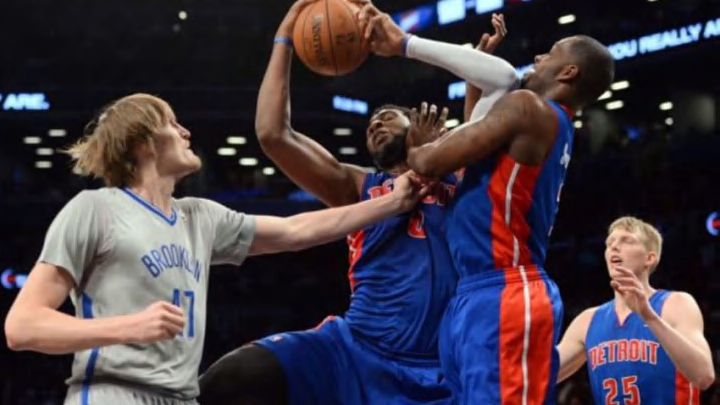The Detroit Pistons were bad at a lot of things last season, and in most cases that made perfect sense due to the construction of their roster. That doesn’t mean that there weren’t areas where they drastically underperformed though. One example of such was the team’s rebounding performance.
Anyone could have predicted the new-look Pistons front line of Josh Smith, Greg Monroe and Andre Drummond having problems with spacing the floor, but one where they would have been assumed to excel was with their work on the boards. Detroit finished the season with an average of 45.4 rebounds per game, which ranked them third overall in the NBA. On the surface that sounds really good, so you’re probably wondering how that was an underperformance?
More from Detroit Pistons
- NBA Trades: Spurs can add a recent lottery pick in this deal with Pistons
- Detroit Pistons draft odds: What are the chances of landing the #1 pick?
- Were the Golden State Warriors right to give up on James Wiseman?
- Ranking the top 18 shooters available on NBA trade market
- Jalen Duren has all the tools to be a star for the Detroit Pistons
By delving deeper into the Pistons’ rebounding stats, the attitude the team carried with them on the court last season becomes immediately apparent. On the offensive end of the court, the Pistons’ extra effort and hustle work was outstanding. They averaged 14.6 offensive boards a night to lead the league, more than two better than the second-place Portland Trail Blazers.
The problem begins when we switch to the opposite end of the floor. Although the Pistons clearly understood the value of extra possessions from their work on the offensive glass, that did nothing to help it translate to them snuffing out opportunities for the opposition.
With 30.8 defensive rebounds a night, the Pistons were worse than mediocre, ranking 21st in the NBA in that category. If you stop to try and think of reasons why they couldn’t rebound consistently at the same rate on both ends of the floor, only one potential answer comes up. A lack of effort and focus.
In a recent article by Vincent Goodwill Jr of the Detroit Free Press, Van Gundy acknowledged that he had noticed this issue himself:
"It was inexplicable to me. So when you have a chance to score, you’ll go get the ball. But that’s a mentality thing. This should be a great defensive rebounding team."
Van Gundy went on to talk about the defense more generally, and perhaps hit the nail on the head:
"I think we have what we need to be good defensively. We have to take more pride in what we did a year ago."
That sentiment can’t be overstated either. Last season’s Detroit team lacked pride and effort, and quite simply it doesn’t seem like Stan Van Gundy will tolerate that. Nor should he, as in whatever shape the Pistons starting five takes this season, it will contain at least two elite rebounders, with one potentially heading up the second unit too.
Over 62 percent of the Pistons defensive rebounds came from the trio of Smith, Monroe and Drummond last season. That offers up two ways in which the Pistons can grow their defensive rebounding this season. Firstly those three can push on and improve, and secondly behind them, they could get more help from the rest of the roster.
Last year Monroe’s defensive rebounding numbers declined from his previous season, so there’s little doubt that he can offer more in that regard, while Smith not only declined from the season before, but posted a mark well below his best.
Smith averaged 5.4 defensive boards last season, which considering it was only two seasons since he was at a career high mark of 7.5 per game, was more than disappointing.
The most important thing entering the season is the fact that Van Gundy sincerely believes they have the necessary defensive tools to improve significantly. With better coaching and motivation, the people of Detroit will hope to see much improved results.
When it comes to rebounding though, it’s pretty simple. The Pistons need to carry the same intensity and effort from one end of the floor to the other, every night of the season.
